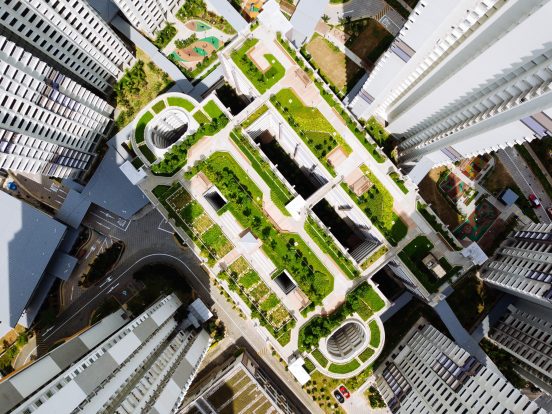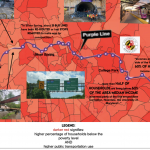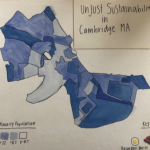Danbury, Connecticut has a diverse population with ranges of race, wealth, education levels, and overall population density. The city of Danbury is broken up into geographic “clusters” which can be sorted using the demographic indicators listed above. Center city Danbury can be characterized by high population density, a high percentage of minority citizens, and incomes between $15,000 and $50,000. Yet southern Danbury is very different: lower population density, a lower percentage of minority citizens, and higher incomes. The distribution of open space follows these trends. Center city Danbury has a high number of smaller parks with fewer active components (like walking trails or playgrounds). These parks are roughly evenly distributed throughout the urban area of Danbury but are not equal in type. The outer parts of Danbury have higher numbers of large tracts of land as well as well-kept playgrounds and parks.
Neighborhoods near open spaces enjoy a number of health benefits, including lower stress levels and higher levels of mental regeneration after stressful experiences. There is extensive literature discussing and proving that having access to open space plays an important role in having strong mental health. Studies also show that parks with more tangible aspects, like walking trails, birdlife, or bodies of water are more effective in boosting moods, making them higher-quality parks. Good mental health is a basic, universal human right, and ensuring access to high-quality open spaces is a core component of having a mentally, physically, and socially healthy community. Danbury’s widespread and affordable public bus system ensures that all neighborhoods have access to different types of parks across the city.
I have created a visual project to explore these issues in more depth. You can view it here.
Featured Image: Photo by chuttersnap on Unsplash.






levinana
May 1, 2020 — 5:57 pm
Your visual was super informative, Veronica! I love the topic of promoting park and open space use to improve mental health. It’s interesting and empowering to know that the typical environmental injustice pattern we see of low-income or minority communities not receiving access to optimal and necessary resources (or environmental bads being actively forced into their communities) does not seem to repeat itself here.
FS
May 1, 2020 — 6:01 pm
The psychological benefits of being in nature have always been interesting. I think it is especially important to have access to nature during a time that technology is so prevalent.
burkea
May 1, 2020 — 6:02 pm
I love this topic, and your accompanying visual! I think that open spaces are often overlooked when thinking about basic resources/ environmental necessities, but they are just as important as access to fresh food and clean water!
My question for you is, why did you decide to focus on open spaces? Do you have any particular memories associated with the outdoors? What impact has access to open spaces had on your life?
galbanv
May 1, 2020 — 6:15 pm
Thanks for the question! I spent a huge amount of my childhood outdoors. I was blessed to grow up in a rural town with lots of open space, and live in a house with a big backyard. I have many, many fond memories of “bushwhacking” in the woods behind my house, catching frogs in a nearby pond, and taking long hikes with my friends. I really think that my time outdoors has shaped who I am: I value the planet enormously and work to do right by Earth.
Because of my attachment to the outdoors, it is difficult for me to imagine a life without so much exposure to nature. Investigating different relationships with nature was the motivation for my topic.
A.R.
May 1, 2020 — 6:15 pm
I love that you pointed out the fact that despite being evenly distributed there is an injustice when considering the quality of the parks. In NYC (where I am from) this discrepancy is also seen between different communities. However, when attempts to make more green space that is equal to affluent or white communities, it often goes unused due to the internalized idea that this space is not for them. Additionally, making better quality parks/ adding green space often leads to gentrification. Considering this, what solutions do you think would be feasible in undoing this injustice without creating a new one?